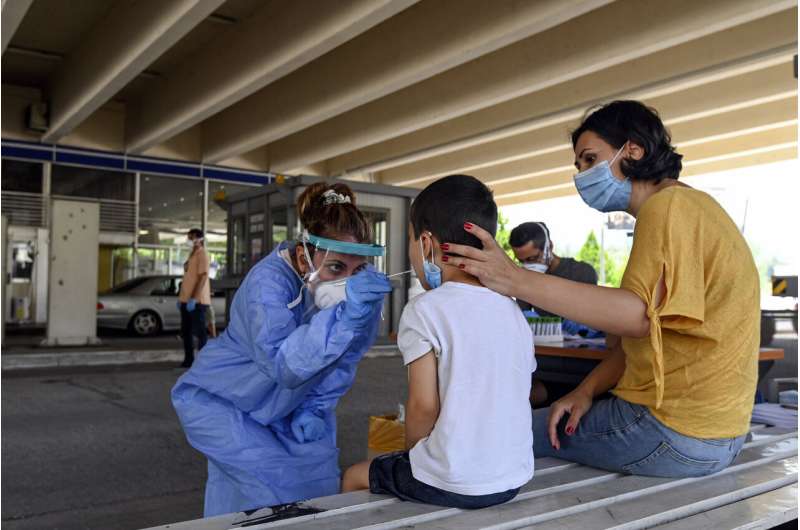A health worker wearing protective gear takes swab samples from tourists to test for the coronavirus, at Promahonas border crossing with Bulgaria, which is the only land border into Greece that is open on Monday, July 6, 2020. Dozens of vehicles of Serb holidaymakers who were trapped at the Greek border overnight have been allowed to cross into Greece after a ban on the entry of people from Serbia came into effect due to a coronavirus flare-up in Serbia. (AP Photo/Giannis Papanikos)
Serbia's president announced the reintroduction of a lockdown after the Balkan country reported its highest single-day death toll from the coronavirus Tuesday.
President Aleksandar Vucic called the virus situation in the Serbian capital of Belgrade "alarming" and "critical" as the city's hospitals neared their capacity limits.
Vucic said the government would reimpose a curfew as of Friday. He said it will "probably" last from 6 p.m. on Friday till 5 a.m. on Monday. He also said the groups of no more than five people will be allowed together.
The country's Health Ministry said Tuesday that 13 people had died in 24 hours in Serbia and 299 new COVID-19 cases were confirmed.
That brought the total to 16,719 confirmed cases and 330 virus-related deaths since the start of the pandemic in Serbia, which went from having one of Europe's strictest lockdowns to a near-complete reopening at the beginning of May.
Soccer and tennis matches were played in packed stands and a parliamentary election was held on June 21 despite warnings from experts that the mass gatherings without social distancing could lead to a new coronavirus wave.
"We have probably relaxed too much. Everyone thought it was all over," Vucic said, angrily rejecting widespread criticism that his insisting on holding the election led to the lifting of the earlier lockdown and the recent coronaviorus case spike.
On Tuesday, Montenegro introduced a compulsory quarantine for all people arriving from neighboring Serbia, citing coronaviorus health risks. Greece also banned Serb tourists from entering the country on Monday.
In an apparent tit-for-tat move, the Serbian government said Tuesday it was introducing a 14-day self-quarantine period for Montenegrin citizens who come to Serbia.
A country of 620,000, Montenegro split from the much larger Serbia in 2006, but many in Montenegro and Serbia remain opposed to the separation. Serbs represent about 30% of Montenegro's population.
Montenegro, the first European country to declare itself free of the coronavirus, has recently seen an uptick in new confirmed cases.
© 2020 The Associated Press. All rights reserved. This material may not be published, broadcast, rewritten or redistributed without permission.






















